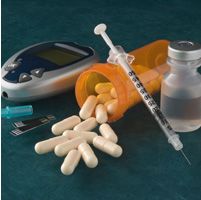Article
Search for Diabetes Cure Highlights Top Stories of 2014
Author(s):
Obesity and physical activity have become a focus of the healthcare community in the recent past and that was no exception in 2014. Over the past 12 months we have highlighted advancements in the treatment, diagnosis and impact of diabetes on our daily lives. Here is a look at the top 10 stories from the year.

Obesity and physical activity have become a focus of the healthcare community in the recent past and that was no exception in 2014. Over the past 12 months we have highlighted advancements in the treatment, diagnosis and impact of diabetes on our daily lives. Here is a look at the top 10 stories from the year.
Hypogonadism Highly Prevalent Among Men with Type 2 Diabetes
Hypogonadism is highly prevalent among men with type 2 diabetes mellitus (T2DM), according to research published in the Journal of Family & Community Medicine.
Type 1 Diabetes Treatment Shows Possible Cure in Animal Studies
Patients with type 1 diabetes could get much needed help from an unlikely source if positive results from animal model tests with a common diabetes drug can be replicated in clinical trials with humans.
http://www.hcplive.com/articles/Type-1-Diabetes-Treatment-Shows-Possible-Cure-in-Animal-Studies
Pancreatic Cancer and Diabetes Link
Although it is just the 10th most prevalent of all cancers, pancreatic cancer is the 4th leading cause of cancer mortality. Just 6% of affected individuals live 5 years after diagnosis.
Almost half of newly diagnosed pancreatic cancer present as new-onset diabetes mellitus and 50% to 80% of people with pancreatic cancer are diabetic. People with long-standing adult-onset diabetes appear to be roughly twice as likely to develop pancreatic cancer. Weight gain, hyperinsulinemia, and accelerated IGF-1 and -2 signaling seem to contribute to tumor formation.
http://www.hcplive.com/articles/Pancreatic-Cancer-and-Diabetes-Link?sao=3
Diabetes Treatment Could be Tied to Toxic Clumps
Researchers in Great Britain and New Zealand believe they have found a commonality that could help the treatment of two types of diabetes.
http://www.hcplive.com/articles/Diabetes-Treatment-Could-be-Tied-to-Toxic-Clumps
Obesity, Diabetes May Elevate Risk of Kidney Stones
The prevalence of kidney stone disease is increasing alongside the spread of obesity, type 2 diabetes mellitus (T2DM), and metabolic syndrome (MetS).
http://www.hcplive.com/articles/Obesity-Diabetes-May-Elevate-Risk-of-Kidney-Stones
FDA Approves Once-Daily Oral Combination Treatment for Type 2 Diabetes
AstraZeneca today announced that the US Food and Drug Administration has approved once-daily Xigduo XR (dapagliflozin and metformin hydrochloride extended-release) for the treatment of adults with type 2 diabetes mellitus.
Charcot Foot: Diabetes at Risk
When we think of diabetes mellitus and its complications, it’s usually the cardiovascular and renal developments that come to mind first. These macrovascular complications create a large burden for affected patients and the healthcare system. Microvascular disease is also a concern and follows hyperglycemia-induced endothelial damage or endothelial dysfunction. Diabetic neuropathy is the most prominent microvascular consequence of diabetes, and often, the foot is involved.
http://www.hcplive.com/articles/Charcot-Foot-Diabetes-at-Risk?sao=31
Weight-loss Surgery May Help Reduce Type 2 Diabetes Odds
A recent study has shown that in addition to losing weight patients who undergo weight loss surgery also decrease their chances of developing type 2 diabetes mellitus.
http://www.hcplive.com/articles/Weight-loss-Surgery-May-Help-Reduce-Type-2-Diabetes-Odds
Examining the Link Between Alzheimer’s Disease and Diabetes
Emerging evidence shows a link between cognitive impairment, specifically Alzheimer’s disease, and diabetes. Speaking at the 2014 Cardiometabolic Health Congress, C. Ronald Kahn, MD, of Harvard Medical School, Boston, MA, discussed the link between Alzheimer’s disease and diabetes, beginning with epidemiological studies 14 years ago. The studies in question showed that patients with type 2 diabetes mellitus had between a 1.5- and 2-fold increased risk of developing Alzheimer’s disease.
http://www.hcplive.com/conferences/cmhc-2014/Investigating-the-Link-between-Alzheimers-Disease-and-Diabetes
Swedish Study Indicates LDL Cholesterol Not a Good Marker of Cardiovascular Risk in Type 1 Diabetes
During the President’s Oral Session at the American Diabetes Association’s 74th Scientific Sessions, Christel Hero, MD, of Sahlgrenska University Hospital in Gothenburg, Sweden, presented data from a major study exploring risk factors for development of cardiovascular disease (CVD) in patients with type 1 diabetes (T1D).




